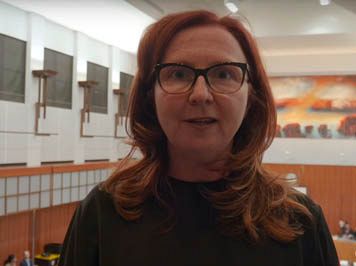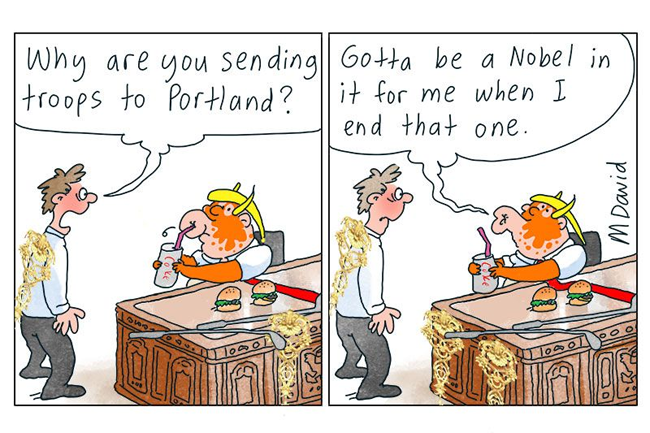Can journalism and the news industry survive the perfect storm of digital disruption? Dr Martin Hirst reviews Katharine Murphy’s essay On Disruption.
Katharine Murphy’s brief essay On Disruption lays out for the reader a useful insider’s view of how the news industry and journalism are struggling to cope with the changes wrought by digital technologies and collapsing business models.
If you have any interest in understanding how the news establishment sees itself, and its prospects for surviving the crisis of profitability and trust, it is worth reading this pamphlet.
At only 120 pages, it would be unfair to expect Katharine Murphy to provide fully-articulated solutions to the almost panic-inducing problems confronting the mainstream media. Having said that, On Disruption is an insight into how establishment journalists see themselves, their mission and the state of their industry.
The key theme that Murphy explores is that the internet and social media instituted a period of disruption that has unsettled the news media and left it in a state of uncertainty that persists today.
This is true enough, but my criticism stems from the technological determinism that frames her view:
‘… the boss has decreed this is the future, not because he or she necessarily wants it to be, but because it is the future, and we are powerless to argue with it.’
This is a classic trope of technological determinism: the belief that technological change is the root cause of everything. In this case, it is the pessimistic, and ultimately passive, view that the future is somehow pre-ordained by the technology and that we are “powerless” to shape the future for ourselves.
Katharine Murphy - insightful as always - on digital disruption . https://t.co/Rr9xDQGcaQ
— jeni thornley (@jenithornley) July 14, 2018
Inevitably, Murphy argues, journalists must adapt to the new ways, rather than challenge them. The second telling point about the quote I’ve used here is the reference to “the boss”. This metaphorical figure is present in a long anecdotal metaphor that Murphy uses to explain how disruption has affected the news industry.
The analogy involves substituting the car industry for journalism. In the analogy, the reader is asked to imagine themselves as a worker in a car factory that is confronting technological change. Okay, it’s only a metaphor, so perhaps not be taken literally, but it is a key section of the first half of Murphy’s argument, so it is worth deconstructing.
Murphy begins by suggesting that the car analogy is ‘possibly psychic penance on my part’ for her previous work on ‘structural adjustment’, which emphasised ‘disruption as an economic homily’ while ignoring ‘the human dimension of the story’. As Murphy acknowledges, when there is personal interest involved, the human dimension suddenly becomes very real.
The take-away from this is that the structural adjustment process now being applied to journalism is a necessary corrective brought about by digital disruption.
However, I can’t ignore the use of the term “structural adjustment”, which is neoliberal parlance for destroying the status quo in pursuit of super profits and often used by the World Bank and the International Monetary Fund.
From the Global Issues website, 'Structural Adjustment — a Major Cause of Poverty':
Following an ideology known as neoliberalism and spearheaded by these and other institutions known as the Washington Consensus (for being based in Washington D.C.), Structural Adjustment Policies (SAPs) have been imposed to ensure debt repayment and economic restructuring. But the way it has happened has required poor countries to reduce spending on things like health, education and development, while debt repayment and other economic policies have been made the priority. In effect, the IMF and World Bank have demanded that poor nations lower the standard of living of their people.
Of course, if you are only responding to the demands imposed by technology, there is no point in resisting or arguing for an alternative approach. As a car worker – or journalist, if we move beyond the laboured metaphor – you can only suck it up and get on with the job.
In fact, you might even blame yourself for the dilemma:
‘You counsel yourself that lots of workers across the economy are facing similar pressures triggered by the same technological shift and this serves you right in some cosmic sense.’
Enjoyed my chat today with Tom Switzer about On Disruption https://t.co/udnBsfFf5h @MUPublishing
— Katharine Murphy (@murpharoo) July 12, 2018
Now we move from technological determinism to the realm of metaphysics, until eventually economics once again brings us back to Earth.
‘Sadly, there is more bad news. A great chunk of the workforce is about to be laid off, not because they’ve done anything wrong, but because the business doesn’t sustain an enterprise on this scale… The future is going to involve not only a shift in work practices — it is going to mean doing a lot more, with less.’
Sadly, this is pretty much how it has gone down in the news industry.
Apart from one or two token stoppages at Fairfax newspapers over the past couple of years, there has been little or no resistance to the decimation of the news industry and the loss of perhaps more than 2,000 journalists’ positions in newsrooms around the country.
The boss explains that people have to go because there’s another problem… this downturn isn’t cyclical. It’s structural…
The boss says we really aren’t sure whether we will be able to keep control of the distribution of the cars we make anymore…
“But do carry on folks,” your boss says to the stunned workforce. “Buck up, we’ll work something out.”
“The boss” in Murphy’s analogy is treated sympathetically, as much a victim of circumstances as the unlucky workers who are sacrificed. And this is what demarcates Katharine Murphy’s insider status and membership of the news establishment. The “boss” is really one of us — not someone with interests diametrically opposed to those of the workforce.
You might be, but I’m not surprised by this. Katharine Murphy is the political editor for The Guardian, which is often perceived as being a progressive, slightly leftish sort of publication. This is itself a debatable view, but what is clear is that Murphy is very much a product of the mainstream consensus inside the news establishment and someone who is thoroughly indoctrinated in the Fairfax worldview.
Murphy self-identifies as a small ‘l’ liberal.
‘I reckon most fair-minded people would say Katharine Murphy is socially progressive, centrist economically, moderately obsessed with the health of the planet and a bit mouthy.’
On @SubjectACT last night, I spoke to @murpharoo about 'On Disruption': what now for political journalism in the digital age? https://t.co/zyQxoKRFKD
— Jasper Lindell (@jclindell) July 11, 2018
Okay, I accept that, but what does an economic centrist believe in? As I’ve discussed above, it appears to align with a passive acceptance of a boss’s right to impose austerity on staff and to insist on productivity increases while cutting costs. It is also a worldview aligned to the news establishment and a journalistic culture that accepts the rules of limited controversy and not presenting a serious challenge to the status quo.
To be fair, Katharine Murphy does present us with the contradictions inherent in such a position and she does attempt to overcome these limitations (albeit unsuccessfully in my view) with a self-reflexive nod to the dearth of self-awareness among journalists.
The culture of journalism is “Stop yapping, the show must go on.” Talking about our experiences is considered professionally self-indulgent…
But I also suspect we don’t talk about this as much as we should because there’s an element of keeping up appearances and preserving professional pride.
I found this section of the essay the most interesting, because it is after this admission that Murphy attempts to address one of the key issues that I see as challenging mainstream journalism: working out the extent to which the crisis in the news industry linked to the political crisis that has delivered Trump to the White House, seen a surge in mass support for right-wing populists in Europe and led the world into the dangerous situation that Irish Times columnist, Fintan O’Toole, has recently described as a dress rehearsal for Fascism.
O'Toole wrote:
'Fascism doesn’t arise suddenly in an existing democracy. It is not easy to get people to give up their ideas of freedom and civility. You have to do trial runs that, if they are done well, serve two purposes. They get people used to something they may initially recoil from and they allow you to refine and calibrate. This is what is happening now and we would be fools not to see it.'
Murphy raises the important question of the relationship between a media ecology that has begun a descent into what she accurately describes as ‘a febrile, superficial, shouty, shallow, pugnacious cacophony of content, where sensation regularly trumps insight’, and the demagoguery of Trump and his European imitators.
Murphy asks us rhetorically:
‘Did we, the disrupted media, somehow create Donald Trump? Did we enable him?’
However, she struggles to provide a coherent answer.
How has the media landscape changed since the 1990’s? @AnthonyDockrill spoke with Katharine Murphy, @murpharoo Political Editor at @GuardianAus https://t.co/b3KOTCBJpP
— 2SER 107.3 (@2ser) July 9, 2018
I would suggest that is because it is almost impossible to do so from inside the news establishment, even as Murphy recognises that this is necessary:
To have the required level of self-awareness, we need to break away from one of our fixed points: a default view of ourselves as institutional value adders… we need to reality check our own propaganda…
We need to own the possibility that we are making things worse.
Well, yes. But, unfortunately, as I’ve been arguing, this is actually harder than it might look from Murphy’s simple injunction. She is right that journalists need to be cautious and clever in how they report Trump so that what they do is not ‘straight out amplification’. I’ve made the point several times in recent columns for IA.
But I don’t think Katharine Murphy has the intellectual distance from the news establishment to see clearly how easy it is to get caught up in normalising Trump’s abnormal behaviour by just following what seem to be the cardinal rules of journalism — to report using a lens of objective pluralism.
‘Journalists have to watch the President and report. Watching powerful figures and keeping them accountable is the job.’
As we know, this is not enough when Trump blatantly tells dozens of lies every day and thrives on gaslighting his allies as much as his foes.
In the end, Katharine Murphy has laid bare a little of her soul and provides some useful insights into how a senior member of the news establishment sees her role and the wider journalistic profession.
Her conclusions are rightly pessimistic.
‘I don’t know if journalism will ultimately survive the great disruption, I don’t know if I can sustain myself as a journalist through this period of change or whether I will burn out or be tossed out or go crazy.’
Nevertheless and sadly in my view, Murphy’s choice is to carry on rather than resist.
‘But rather than worry ourselves to paralysis, my colleagues and I press on… and will go on doing that for as long as the endeavour remains viable.’
To me that sounds like playing in the band while the Titanic slips beneath the waves.
You can follow political editor Dr Martin Hirst on Twitter @ethicalmartini.
Book review: On Disruption, Katharine Murphy (2018) https://t.co/JGlzUCfhkE Ping @murpharoo @earleyedition #auspol
— Matthew da Silva (@mattdasilva) July 8, 2018

This work is licensed under a Creative Commons Attribution-NonCommercial-NoDerivs 3.0 Australia License
Monthly Donation
Single Donation
Politics Podcast: Katharine Murphy 'On Disruption' - The Conversation AU https://t.co/ECdhxHnfaj pic.twitter.com/k0svneEZCO
— Politics Newz (@PolticsNewz) July 6, 2018
Embrace change. Subscribe to IA.











